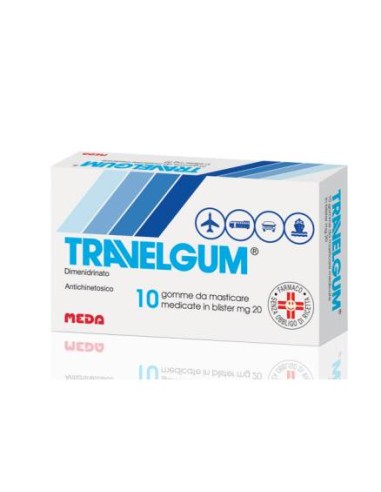Your cart
There are no more items in your cart
Antihistamine Travelgum 10gomme mast 20mg
TRAVELGUM
active ingredients
Each medicated chewing gum contains: Active ingredient: Dimenhydrate 20 mg. Excipients with known effects: aspartame (E 951), sorbitol (E 420), sucrose, glucose and lactose.Excellent
Hydraulic acid, Dexter, Sorbitol (E 420), Talco, Magnesium stearate, Magnesium light oxide, Glucose liquid, Macrogol 35000, Titanium dioxide (E 171), Calcium carbonate, Sodium sacrylic acid, Aspartame (E 951), Povidone 25, Saccalaxium, Levourthanol).Therapeutic indications
Cinetosis (nausea and vomiting during travel by car, train, plane and ship).Contraindications
Hypersensitivity already known to the component or to other antihistamines. Fenilchetonuria. Pregnancy. It is not recommended to use it in infants and premature, as well as during breastfeeding.Population
Adults and children (aged between 4 and 12 years): start chewing 1 gum at the first symptoms of nausea. The effect is felt after 2-3 minutes; to achieve maximum effectiveness continue to chew for 5-10 minutes. The effect lasts depending on the situation and the patient from 1 to 3 hours. Adults: by attenuating the effect or by continuing the uncomfortable situation it is possible to repeat the administration after 3-4 hours, up to a maximum of 4 chewing gums medicated daily. Children: repeat not more than twice a day. Do not exceed the recommended doses. People who are particularly sensitive to usin TRAVELGUM 20 mg chewing gums medicated before special situations such as: winding roads, turbulence during flight, bad weather during sea trips etc. In this way you can also avoid the first symptoms of malaise. Travelgum 20 mg medicated chewing gums are pleasant peppermint flavor; should not be swallowed, since in this case initial nausea would increase further.Conservation
Do not store at temperature above 25°C.Warnings
Never swallow Travelgum chewing gums. In diabetic subjects consider that a chewing gum contains about 500 mg of glucose and sucrose. Use with caution in subjects suffering from glaucoma, prostatic hypertrophy, other urinary retention syndromes, intestinal obstruction, bronchial asthma, epilepsy. Keep the medicine out of reach of children. Travelgum contains: - 3 mg of aspartame (E 951) for chewing gum; - less than 1 mmol (23 mg) of sodium for chewing gum, that is essentially “without sodium”; - 285 mg of sorbitol (E 420) for chewing gum. Patients with hereditary intolerance to fructose should not be given this medicine; - sucrose: patients with rare hereditary problems of fructose intolerance, glucose-galactosis mal absorption, or isomaltase sucrasis failure, should not take this medicine; - glucose and lactose: patients with rare hereditary problems of galactose intolerance, total lactase deficiency, or glucose-galactose mal absorption, should not take this medicine.Interactions
During the treatment with Travelgum it is appropriate to avoid the contemporary use of alcoholic beverages and hypnotic, sedative or tranquilizer drugs, in order to prevent any additive phenomena of sedation. The use of antihistamines at the same time to certain ototoxic antibiotics can mask the first signs of ototoxicity, which can only be revealed when the damage is irreversible.Effects
With the use of antihistamines can occur drowsiness, dry mouth, photosensitivity, atmospheric disorders, urination disorders, headaches, anorexia, nausea, skin reactions on an allergic basis. Less frequently dizziness, astenia, insomnia (especially in children), euphoria, tremors, hypotension, tachycardia. Reporting of suspicious adverse reactions The reporting of suspicious adverse reactions occurring after the authorization of the medicinal product is important, as it allows continuous monitoring of the benefit/risk ratio of the medicinal product. Healthcare workers are required to report any suspected adverse reaction via the national reporting system at the address https://www.aifa.gov.it/content/segnalazioni-reazioni-avverse.Overdosing
In case of accidental poisoning the treatment will be symptomatic: there are no specific antidotes for H1 blockers.Use only in case of actual need and under the direct control of the doctor.
Source: Farmadati
- Deductible product
- Yes
005170028
13 Items
New
No reviews

